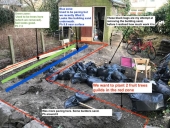
 11
11





 14
14




 10
10




https://againfarmstead.com/ | @againandagainfarmstead
 3
3




Life's too short, eat desert first! [Source of quote unknown]
You have to be warped to weave [ditto!]
 10
10








Voted the best answer. Fire an microbes produce completely different results
 4
4








Invasive plants are Earth's way of insisting we notice her medicines. Stephen Herrod Buhner
Everyone learns what works by learning what doesn't work. Stephen Herrod Buhner
 4
4




Jill Dyer wrote:Some research needed, but my brain storage collection of "useful" info indicates that wood chips are fine for paths and established trees with good root systems, but not good for mulching veggies, as their breakdown can produce a nitrogen imbalance.
Become extra-civilized!
 8
8





 4
4




Coydon Wallham wrote:
"Nitrogen imbalance" as in excess or shortage?
Proudly presenting RocketMassHeaters.com
A good starting point to all RMH research
How Permies.com works





 5
5




Proudly presenting RocketMassHeaters.com
A good starting point to all RMH research
How Permies.com works











 3
3




Benjamin Dinkel wrote:Since wood chips are mostly wood (lignin) and are mostly carbon they lack nitrogen when it comes to composting or breaking down. For compost a ratio of roughly 30:1 C:N is ideal. Adding nitrogen rich material (IE manure) can help speed up the break down and prevent the "locking" of nutrients.
Become extra-civilized!











 11
11




Benjamin Dinkel wrote:
Coydon Wallham wrote:
"Nitrogen imbalance" as in excess or shortage?
Since wood chips are mostly wood (lignin) and are mostly carbon they lack nitrogen when it comes to composting or breaking down. For compost a ratio of roughly 30:1 C:N is ideal. Adding nitrogen rich material (IE manure) can help speed up the break down and prevent the "locking" of nutrients.











 4
4




Phil Stevens wrote:This is very much the case in a composting setting where a hefty dose of "green" material is required. It's also what happens in a situation where raw wood chips are mixed into soil and this is why the conventional wisdom always warns gardeners against using them. But a layer of chips on the surface will be colonised by fungi, which break down lignin without needing any N inputs and in doing so create a well-balanced addition to the topsoil.
Become extra-civilized!
 4
4















 5
5




Coydon Wallham wrote:So better to not add liquid nitrogen, or would both methods work out okay?












 5
5




Phil Stevens wrote:This is very much the case in a composting setting where a hefty dose of "green" material is required.
How Permies works: https://permies.com/wiki/34193/permies-works-links-threads
My projects on Skye: The tree field, Growing and landracing, perennial polycultures, "Don't dream it - be it! "
 4
4




 3
3




--
"Whitewashed Hope: A Message from 10+ Indigenous Leaders and Organizations"
https://www.culturalsurvival.org/news/whitewashed-hope-message-10-indigenous-leaders-and-organizations
 4
4




Nancy Reading wrote:
I'm wondering now if allowing the woodchips to decompose via a fungal route ends in a different pH soil amendment than if urine (or another high nitrogen substance) was added so composting the chips bacteriologically.
(another permie with acid soil and (now) trees for mulching)
--
"Whitewashed Hope: A Message from 10+ Indigenous Leaders and Organizations"
https://www.culturalsurvival.org/news/whitewashed-hope-message-10-indigenous-leaders-and-organizations
 2
2





|
If you live in a cold climate and on the grid, incandescent light can use less energy than LED. Tiny ad:
Learn Permaculture through a little hard work
https://wheaton-labs.com/bootcamp
|


